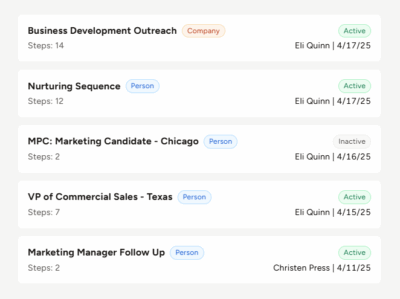Recruitment advice can be a tricky thing. It all depends upon the outcome of the advice. That being said, the litmus test is the answer to this question: “Did the recruitment advice result in more placements for your desk and/or revenue for your agency?”
If the answer is “No,” then it probably wasn’t good advice.
Good recruitment advice generally focus on the things that you can control. Or at the very least, on the things that you can influence. After all, many things are out of your direct control.
For example, you can’t control whether the Stock Market tanks or whether one of your clients implements a hiring freeze for an unspecified amount of time. In fact, you don’t even have any influence over such events.
However, there are some things that you can control and over which you do have influence. Those things directly involve you and how you run your recruiting desk and/or recruitment agency.
Recruitment advice in the form of questions
In fact, there are some questions you should be asking yourself. Your answers to these questions will help determine, at least in part, how much you can grow your business.
Below is recruitment advice for generating more revenue in the form of three questions:
Question #1—How can I provide more value?
Now of course, since you interact all day with candidates and clients, those are the two groups of people to which you want to provide this value. The first step is to identify how much value you currently provide to them, but we’re going to throw you a curveball:
When you calculate the value that you currently provide, do NOT include placements.
That’s right. What value do you provide outside of placing candidates at your clients? That’s the question that cuts to the heart of the matter. After all, you get paid for making placements. What you should be scrutinizing is your value in situations where you don’t get paid. How does that change things?
Below are a few of the situations to which I’m alluding:
- Marketing grade-A candidates—Yes, it doesn’t mean you’re going to get a job order out of it. However, hiring managers appreciate being apprised of top talent in the marketplace. This is especially the case if they have no idea that the talent exists. In this case, the hiring manager is apt to remember the candidate if they have an opening or a need in the future. By extension, they will also remember you.
- Providing excellence throughout the process—Even if the process does not end with you making a placement, prep and debrief both the candidate and the client in a thorough fashion. Follow up, follow through, and make sure that everybody who comes into contact with you has a great experience. Placement or not, they need to value your participation, especially in a consultative role.
- Offering an electronic newsletter—People still read newsletters these days, especially candidates who want to know how to advance their careers. They want to know how to find premium career opportunities, how to get noticed by top employers, and how to nail the interview process. On the other hand, your clients probably need to be educated about the employment marketplace, so they can stay in touch with current conditions. Unless they already know all they need to know. Would you say that’s the case?
Question #2—Am I engaging in professional development?
Yes, being awash in job orders and making placements is a lot of fun. It’s certainly tempting to only focus on that all day long, but you must not let yourself slack in this area. Think about it for a moment. Recruiters portray themselves as specialists of a sort—talent specialists, specifically. What are some other specialists in the world of employment? Doctors, lawyers, even plumbers. If you hired any one of these people, would you not want to know that they are continuously trying to improve themselves and become better at their chosen profession? Of course you would. The same holds true with recruiters.
We’re not talking about major “I have seen the light!” revelations, either, especially if you’ve been in the business for a considerable length of time. All it takes is a small piece of information, something new that you’ve never heard about or tried before. It could make a difference on your desk and have a huge impact on your billings.
Continuous training and professional development is NOT a time waster. It’s an investment—an investment in you as a recruiter and in the future of your recruiting agency. Not only that, but this is also an excellent way to stand out from other recruiters in your niche. You have to operate under the assumption that your competition is continually training and investing in themselves. If you don’t do the same thing, then you run the risk of falling behind. And if you’re standing still, you’re really not standing still . . . you’re falling behind.
Question #3—Do I have an actual business plan?
Many recruiters who run their own agency are better recruiters than they are business owners. However, if you’re an agency owner, then you can’t neglect the business side of your recruiting enterprise. The first step in having an actual business plan is identifying your agency’s business model:
- What are the different ways in which your agency generates revenue?
- In which order are those ways ranked (from the most revenue to the least)?
- What tools and/or resources contribute to the generation of that revenue?
- Has your business model changed in the past? If so, how did it change?
- How might your business model change in the future?
That last question is the most compelling one, especially since we’re talking about generating more recruiting revenue. If you’re looking to bill more, what is your business plan for expansion? Growth doesn’t just “happen” of its own accord. It usually requires catalysts, and a good business plan serves as the genesis for such catalysts.
Below are some possible strategies for inclusion in your business plan:
- Niche expansion—What space still exists in your current niche? Can you start targeting candidates and fill positions that you’ve never targeted and filled before? Identify these areas and weigh the pros and cons of expansion.
- Split placements—If you have more job orders than you can fill, that might seem like a great situation . . . until you realize that you can’t fill them. What use is an open job order you can’t fill? Instead, use another recruiter’s candidate to fill it. Sure, you’ll have to split the fee, but without that candidate, all you’d have is an open, unfilled job order.
- Contract placements—A fundamental shift has taken place in the employment marketplace. Companies now value contract candidates during all economic conditions, not just during challenging ones or recessions. It gives them more flexibility, more control, and greater opportunities for finding top talent. If you’re not currently offering contract staffing services to your clients, then you are missing an opportunity for business growth.
Generating more recruiting revenue than you did last year is never easy. It takes planning, effort, and the willingness to ask the tough questions. What questions have you asked yourself? Did they include the three questions we’ve just discussed?
Ask the tough questions, give honest answers, and make the changes and adjustments you need to make. That’s the kind of recruitment advice that can lead to a great year for you and your agency in 2019!
Recruitment advice: the best software
And if you want more great recruitment advice, then look no further than the Big Biller recruiting software. Earlier in this blog post, we listed three ways that you can provide more value:
- Marketing grade-A candidates
- Providing excellence throughout the process
- Offering an electronic newsletter
Big Biller can help you accomplish all three! It’s an applicant tracking software designed to help recruiters streamline the placement process and also stay “top of mind.”
You can try the Big Biller software for FREE! Just click here to start your 15-day trial of Big Biller and see what the software can do for you!








